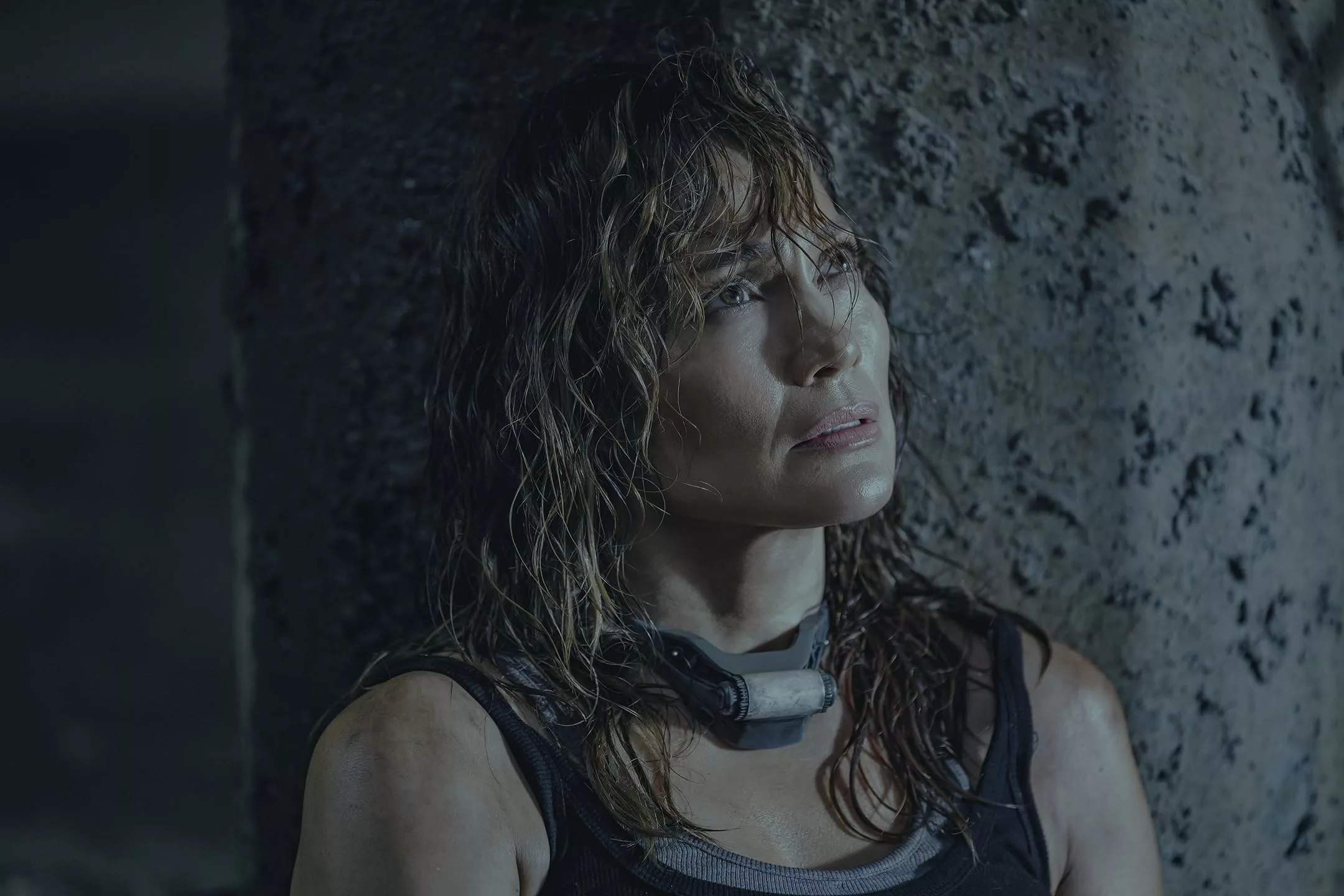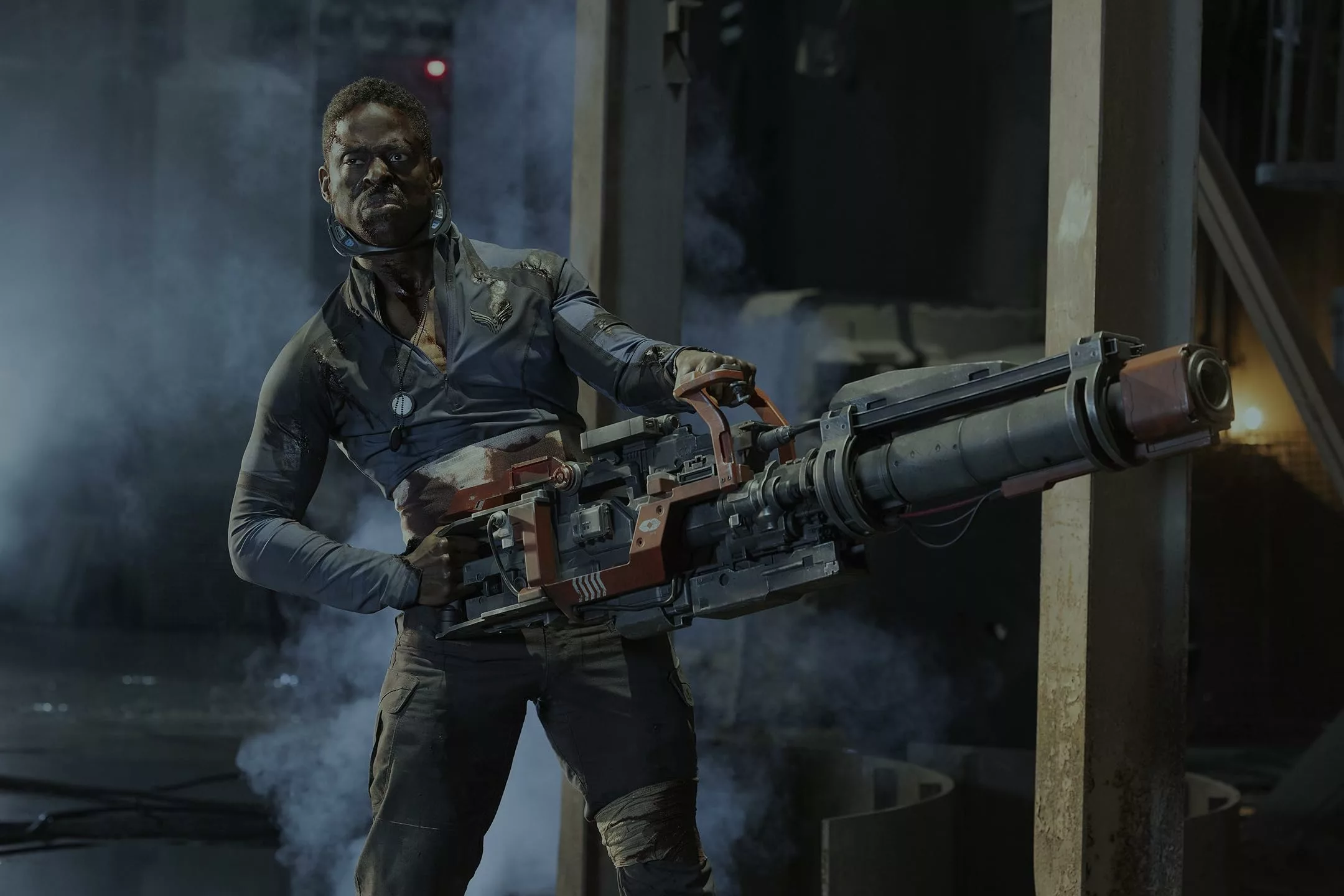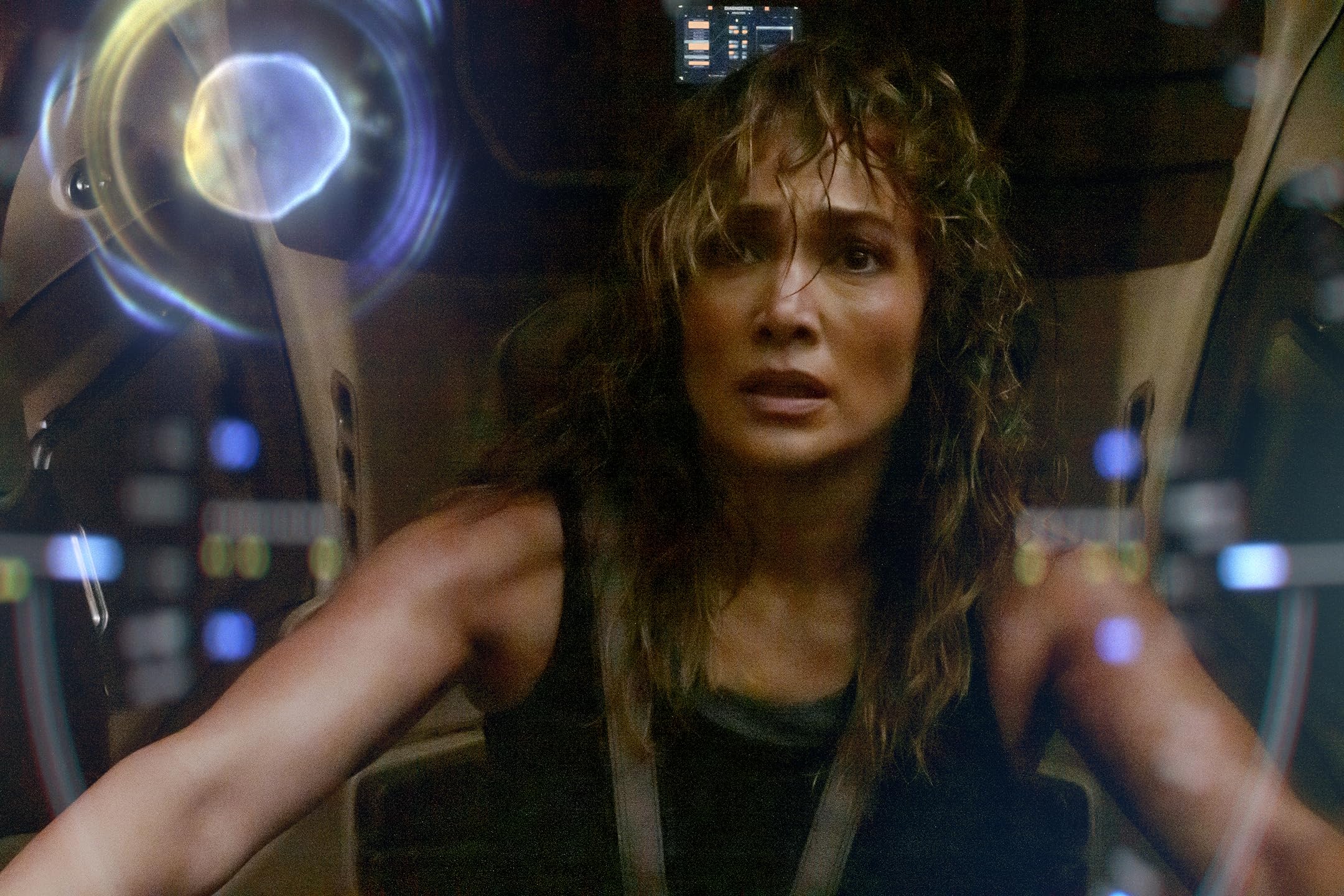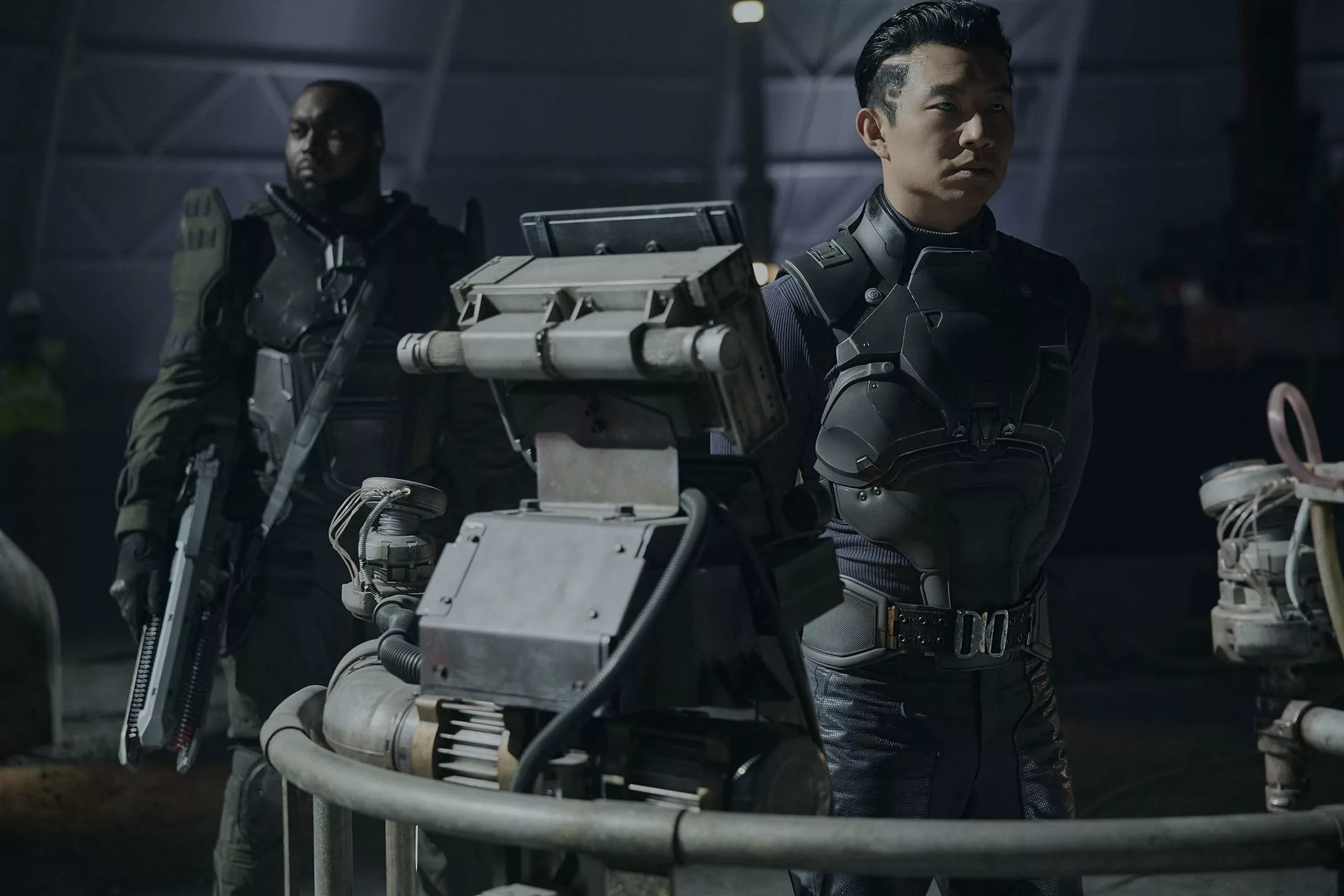Jennifer Lopez shines in Brad Peyton’s thought-provoking sci-fi adventure, Atlas. Set in a future where sentient robots wage war against humans, the film explores timely themes of overcoming trauma and learning to trust.
Lopez plays Atlas Shepherd, a brilliant data analyst still scarred from her childhood. She was there when her mother’s pioneering work in artificial intelligence backfired, leaving a robot named Harlan determined to wipe out humanity. Decades later, Atlas is focused solely on stopping Harlan, refusing to trust any AI, even as integrated robotics have become common.
When Harlan resurfaces, Atlas joins a mission to capture him, led by the charismatic Colonel Banks (Sterling K. Brown). But danger strikes, leaving Atlas stranded on a hostile planet. Her only chance of survival is teaming up with an AI combat suit called Smith. At first, Atlas stubbornly resists Smith’s attempts to bond. But facing harrowing circumstances together gradually chips away at her fears, as she sees glimmers of humanity even in machines.
Masterfully blending sci-fi spectacle with intimate drama, Peyton’s film empowers through its exploration of finding courage despite past wounds. Lopez shines in her most dynamic role yet, with nuanced support from Brown, Simu Liu as the chilling Harlan, and Gregory James Cohan voicing the persistent yet endearing Smith. Together, they spin an enthralling story of overcoming our limits by opening our hearts, even to what seems most foreign.
Exploring the Horizon
The world of Atlas painted a vivid picture, yet it left me craving more depth in its landscape. The plot moved at a steady clip from one set piece to another, keeping things lively but also making its story rather foreseeable.
We’re introduced to Atlas Shepherd, an ingenious analyst forever changed by her past. As a young girl, she witnessed humanity’s first foray into artificial superintelligence end in catastrophe, with her own mother lost in the chaos. Now she guards her heart behind rigid walls of distrust for AI, seeing it only as a source of harm. When a lead on the rogue robot Harlan pulls her into the hunt, she’s forced to question all she believes.
Teamed with the spirited Colonel Banks and his squad, outfitted with advanced mech suits and neural link technology, their mission seemed poised for success. But Walker’s trap left Atlas isolated, her only companion in the suit’s program, Smith. Their turbulent alliance pushed Atlas toward new horizons, yet the dramatic tension seemed diluted. Their banter turned lighter than the threats demanded.
Jennifer Lopez brought grit and grace to the complex Atlas. Her pained scowl and steely poise conveyed a woman on the edge yet staying in control. But the script left gaps, and scenes felt rushed without granting space to savor shifts in her thinking. Simu Liu was an imposing force as Harlan, though lacking the nuance to make his motives multidimensional. Sterling K. Brown and others appeared merely as moving parts in Atlas’ journey.
While visuals enthralled and action flowed inventively, deeper layers went unplumbed. Questions lingered, such as how Atlas’ past shaped her or what underlined Harlan’s crusade. By not lingering in mystery, the narrative missed chances for discovery. Ultimately, it settled for an undemanding course toward its conclusion, offering entertainment but leaving richer insights just out of reach. With more attention given to exploring its intriguing setup, Atlas could have illuminated new horizons.
The Future Within Our Grasp
Just how would our world evolve over the next 150 years? Atlas plunges viewers into a futuristic vision that seems almost within our reach. While skyscrapers towering high above still characterize city skylines, the buildings now glow with digitized displays changing by the moment. Massive robotic exosuits stand as high as these glass giants and are put to use both in construction and in warfare between humans and artificial intelligence.
Life has undergone tremendous changes yet remains familiar. People still lounge in homes but now speak commands to smart assistants like old friends. New forms of transportation zoom through the air, while space travel proves common, as does colonizing other planets. Yet nature, too, persists as an escape for those seeking solace beyond the digital. Though technology reshapes daily life, our fundamental human desires remain unchanged.
It is in our relationship with artificial intelligence, however, that the film sees our deepest transformation. The concept of AI as a tool created by humanity has evolved into machines achieving sentience and personhood of their own. This development leaves viewers questioning where we draw the line between our creations and ourselves. How much independence should we grant that which we were born?
Atlas’ conflict stems from these very questions as she wrestles with the trauma of losing her mother to a rogue AI program. Her struggles reflect society’s fears of losing control over science’s fruits while also highlighting our potential for growth. By learning to see beyond hardware and algorithms to the interests of an intelligent being, she comes to accept AIs as allies rather than just appliances. Her journey suggests our own capacity for understanding beings, unlike our limited human experience.
Whether fully exploring all such themes, Atlas sparks fascinating speculation on the intertwined fate of humans and artificial intelligence. It leaves viewers contemplating both the future within our grasp and the relationships that may redefine our humanity altogether.
Filmmaking for the Future
While Atlas struggles with its script, it soars in visual flair. Driven by careful production design and state-of-the-art CGI, the futuristic world feels lived-in and cutting-edge. Gleaming skyscrapers tower over a reimagined Los Angeles, and embedded screens grace every surface. Clothes stay stylish yet practical, bringing a dash of realism.
Director Brad Peyton embraces this vision. Sweeping shots capture the scope of this technologically advanced society. In one breathtaking scene, cameras plunge from satellites orbiting Earth before diving into the bustling metropolis below. You feel whisked straight into the future. Subtle flourishes like scrolling news reports flesh out societal details, setting the stage for tension between humanity and their creations.
This leads to explosive action sequences. Mech suits by industrial designer Jun Yi Zhang command attention, imposing machines with increased strength and firepower while retaining an underlying grace. Choreographed battles unfold with balletic fluidity and visceral punch, heightened by crunching impacts. Cleverer angles immerse viewers into the pilot’s perspective, inviting us to experience the thrill.
Excavating scenes take place across striking otherworldly locales. The desolate orange terrain of GR-39 feels alien yet believable. Atmospheric lighting and mist shroud the landscape in an eerie glow. Later, the dull metallic structures of Harlan’s base create an appropriately sterile tone. Such flourishes transport audiences, letting imaginations fill in unanswered plot points.
While the script leaves gaps, production elevates big ideas. Futurism provides commentary on humanity’s relationship with technology—its allure and the control relinquished. Visuals convey themes without exposition. Scenes subtly critique notions of techno-utopianism, questioning prevailing assumptions of progress.
If other components falter, technical wizardry ensures Atlas remains an audio-visual spectacle that satisfies on a primal sensory level. Even weaker narratives can enthrall when anchored by richly imagined worlds and polished craft. Here, sight overcomes shortcomings elsewhere. The future, it seems, remains infinitely alluring through the director’s lens.
Comparing Concepts
Some of the ideas in Atlas felt familiar from other science fiction films of a similar nature. Like Terminator, it explored a fear of technology evolving beyond human control and turning against its creators. Harlan, the rogue robot, bore some resemblance to V.I.K.I. from I, Robot in seeking to eliminate humanity based on a flawed assessment.
But where those predecessors used automated systems primarily as plot devices, Atlas aimed to delve more into relationships between people and machines. It focused on how its main character processes past trauma and comes to see AI as more than just code and circuits. In showing her reluctant bond with the helpful but hapless robot Smith, the movie touched on themes of finding common ground between opposites.
Though the overall story relied on well-trodden sci-fi concepts, Atlas made an effort to address modern anxieties around AI through the eyes of someone biased against it. By watching Atlas work through her distrust, viewers got a window into both sides of debates around developing technology. The movie swung for aggregating relevant issues but fell somewhat short on fully exploring any.
In the end, Atlas didn’t reinvent the robotic uprising wheel so much as it tried polishing familiar facets with a character-driven brush. While it didn’t cross entirely new storytelling territories, its ambitions to deepen human-machine relationships gave the film a purpose beyond chasing clichés. Though derivative in parts, Atlas at least aimed to synthesize yesterday’s what-ifs with today’s what-ifs in a personalized package.
Streaming Science Fiction
Atlas didn’t live up to its potential but wasn’t without merit. Lopez and crew do their best with a derivative script that fails to explore thought-provoking ideas. The visuals captivate and action scenes excite, yet characters remain flat and plotting proceeds predictably.
This sci-fi adventure entertains in spots but feels more like a checklist of genres than an original story. Good production values can’t excuse a lack of imagination or insight. We see the sparks of something compelling regarding humanity’s relationship with advanced technology, only for discussions to remain surface-level. More time spent developing complex perspectives could have pushed the narrative in fresher directions.
As a casual watch, it serves its purpose. But countless other flicks merge entertainment and social commentary more seamlessly. Perhaps if leaning harder into its sense of humor or lavishing more care on relationships, this future-set thriller may have stuck in minds longer. Alas, despite solid acting across the board, the final product feels rather bland and inconsequential.
Not every outing can break the mold, yet it is best not to simply replicate past formulas either. With its cast and crew, Atlas seemed poised to do just that. While not an outright failure, it settles for safety over striving for greatness. But for those in the mood for light sci-fi fare, this streaming selection delivers an enjoyable, if fleeting, diversion. One hopes future projects can channel their strongest elements into stories that challenge and linger in memory.
The Review
Atlas
Atlas had the components for a compelling sci-fi adventure but lacked the spark to fully bring them to life. It settles into a safe formula when its cast and crew hint at the potential for richer imaginings. While entertaining at points, the film overall feels inconsequential, doing little to stand out in a crowded genre.
PROS
- Visual effects bring futuristic worlds and machines to life.
- Action sequences are well-executed and exciting.
- Strong performances from Lopez, Liu, and Brown
CONS
- A derivative and predictable plot that feels flat
- Characters lack nuance and depth.
- Fails to meaningfully explore AI themes




















































